本文目录
不定代词用法总结表格
以下是我为大家整理的不定代词的用法 总结 ,希望能帮助大家更好地认识不定代词,提高英语水平。
1)不定代词有all , both, every, each, either, neither, more, little, few, much, many, another, other, some, any , one, no 以及some, something, anything, everything, somebody, someone, anybody, anyone, nothing , nobody, no one, none, everybody, everyone.等。
2) 不定代词的功能与用法:
a. 除every 和no外不定代词既可用作名词,也可用作形容词。every和no在句中只能作定语。
I have no idea about it.
b. all 都,指三者以上。
all 的主谓一致:all的单复数由它所修饰或指代的名词的单复数决定。
All goes well. 一切进展得很好。
all 通常不与可数名词单数连用,如:不说 all the book,而说 the whole book。
但all可与表时间的可数名词单数连用,如 all day,all night,all the year; 但习惯上不说 all hour,all century。
all还可以与一些特殊的单数名词连用,如 all China, all the city, all my life, all the way
3) neither 两者都不
a. neither作主语时,谓语动词用单数。
b. 作定语与单数名词连用,但neither… nor 用作并列连词,可与复数名词连用。其谓语采用就近原则。
c. 可用于下列句型,避免重复。
She can't sing,neither (can) he.
neither 与nor
d. 如前句是否定式从句,则主句用neither,而不用 nor。
If you don't do it,neither should I. 如果你不干,我也不干。
e. 如后连续有几个否定句式,则用nor,不用neither。
He can't sing,nor dance,nor skate.
4) both 都,指两者。
a. both 与复数动词连用,但 both… and…可与单数名词连用。
b. both, all 都可作同位语,其位置在行为动词前, be 动词之后。如果助动词或情态动词后面的实义动词省 去,则位于助动词或情态动词之前。
Who can speak Japanese? We both (all) can.
4) neither 两者都不
a. neither作主语时,谓语动词用单数。
b. 作定语与单数名词连用,但neither… nor 用作并列连词,可与复数名词连用。其谓语采用就近原则。
c. 可用于下列句型,避免重复。
She can't sing,neither (can) he.
neither 与nor
d. 如前句是否定式从句,则主句用neither,而不用 nor。
If you don't do it,neither should I. 如果你不干,我也不干。
e. 如后连续有几个否定句式,则用nor,不用neither。
He can't sing,nor dance,nor skate.
--------------------------------------------------------------------------------------
不定代词用法总结相关 文章 推荐:
不定代词 的 用法
代词 的 用法总结 归纳
完形填空语法之 不定代词 的 用法
八年级英语期中考试复习要点 总结
英语知识大全
高一阶段如何学好英语的几点建议
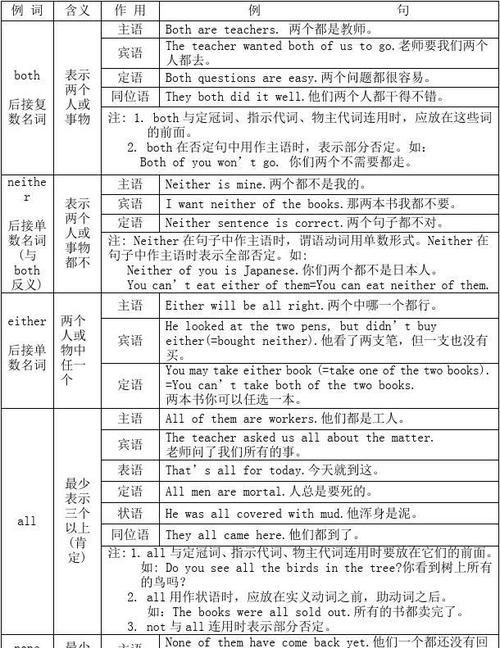
复合不定代词用法归纳总结
1、作主语
Both of them are teachers.他们两人都是教师。
做主语时谓语动词用复数
2、作宾语
I know nothing about this person.我对这个人一无所知。
3、作表语
This book is much too difficult for a child.这本书对一个小孩来说太难了。
4、作定语
There is a little water in the glass.玻璃杯里有一些水。
可以在强调一下a little,little,a few,few的区别:
a little通常带有肯定的意思,表示还有一点;而little带有否定的意思,只剩一点儿了。(little后通常加不可数名词)a few和few同上。(后通常加可数名词)
记忆口诀:有a就有(有一点),没a就没有(几乎没有)。
5、作状语
I can't find my book anywhere.我在任何地方都不能找到我的书。
这一句也可以表示成:
I can find my book nowhere.我在任何地方都不能找到我的书。
修饰不定代词的词,一般情况下要后置。
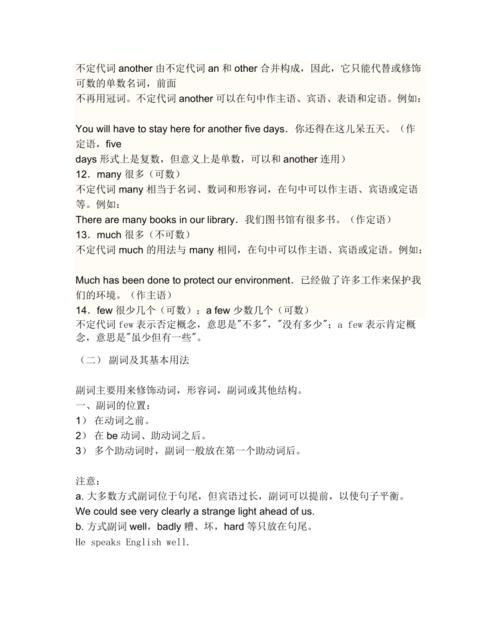
不定代词的用法
不定代词的用法如下:
1、在这些不定代词中,多数都能作主语、宾语、表语或定语,但是代词 none 以及由 some, any, no 和 every 构成的合成代词只能作主语、宾语或表语,不能作定语,而 no 和 every 则只用作定语。
2、有些不定代词用于指两者(如both, either, neither),有的不定代词用于指三者(如all, any, none, every),注意不要弄混:
Both of my parents are doctors. 我的父母都是医生。
All of the students are interested in it. 所有的学生对此都很感兴趣。
There are trees on any side of the square. 广场的每一边都种有树。
He has two sons, neither of whom is rich. 他有两个儿子,都不富有。
He has three sons, none of whom is rich. 他有三个儿子,都不富有。
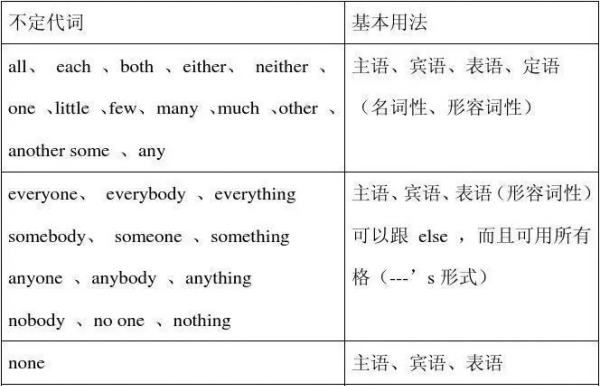
3、复合不定代词包括 something, somebody, someone, anything, anybody, anyone, nothing, nobody, no one, everything, everybody, everyone 等。
它们在句中可用作主语、宾语或表语,但不能用作定语。something, someone 等和 anything, anyone等的区别与 some 和 any 的区别一样,前者一般用于肯定句,后者一般用于否定句、疑问句或条件句(参见 any & some)。具体使用时应注意以下几点:
1)复合不定代词受定语修饰时,定语应放在它们后面:
There is nothing wrong with the radio. 这收音机没有毛病。
Have you seen anyone [anybody] famous? 你见过名人吗?
2)指人的复合不定代词若用作主语,其谓语动词一般用单数,相应的人称代词和物主代词也用单数 he, him, his (不一定指男性)。但在非正式文体中常用复数代词 they, them, their:
Everyone knows this, doesn’t he [don’t they]? 人人都知道这一点,不是吗?
If anybody [anyone] comes, ask him [them] to wait. 要是有人来,让他等着。
3)指事物的复合不定代词若用作主语,谓语动词只能用单数,相应的人称代词也只能用 it,而不用 they:
Everything is ready, isn’t it? 一切都准备好了,是吗?
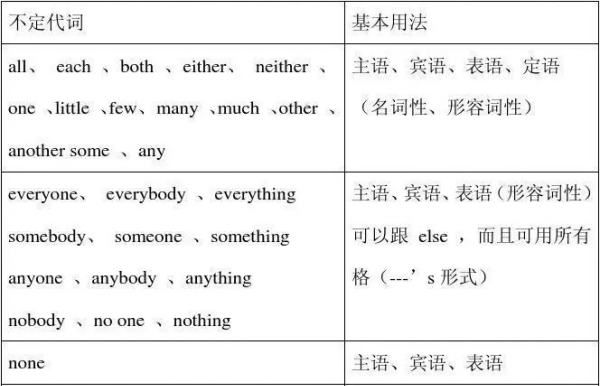
4)anyone, everyone 等只能指人,不能指物,且其后一般不接of 短语。若是指物或后接 of 短语,可用 any one, every one (分开写):
any one of the boys (books) 孩子们(书)当中的任何一个(本)
every one of the students (schools) 每一个学生(一所学校)
4、按英语习惯,any 以及含有any的复合不定代词用于否定句时,它只能出现在否定词之后,而不能在否定词之前:
误:Any one doesn’t know how to do it.
正:No one knows how to do it. 任何人都不知道如何做它。
误:Anybody [Anyone] cannot do it.
正:Nobody [No one] can do it. 这事谁也干不了。
误:Anything cannot prevent me from going.
正:Nothing can prevent me from going. 什么也不能阻挡我去。
5、不定代词all, both, every 等与 not 连用时构成部分否定;若要表示完全否定,则需换用 none, neither, no one等。比较:
All of the students like the novel. 所有这些学生都喜欢这本小说。
Not all of the students like the novel. 并不是所有这些学生都喜欢这本小说。
All of the students don’t like the novel. 并不是所有这些学生都喜欢这本小说。
None of the students like the novel. 这些学生当中没有一个喜欢这本小说。
6、all, both, each 等用作同位语
若用作主语同位语,主语可以是名词或代词;若用作宾语等其他成分的同位语,则宾语等成分必须是人称代词,而不能是名词:
We have all read it. 我们都读过他。(all 修饰的主语是代词)
The villages have all been destroyed. 村庄都被毁了。(all 修饰的主语是名词)
They told us all to wait there. 他叫我们都在那儿等。(all 修饰的宾语是代词)
但不能说:They told the men all to wait there. (all 修饰的宾语是名词不是代词)
7、so little 与 such little的区别
用so little还是such little取决于little的意思:若表示数量方面的“少”,则用so little;若表示形状体积的“小”,则用such little:
He has so little time for reading. 他读书的时间少得可怜。
I’ve never seen such little boxes. 我从未见过那样小的盒子。
8、some 与 any的用法区别
一般说来,some 用于肯定句中,any 用于否定句和疑问句中。但是,在表示请求、邀请或征求意见的句子中,通常要用 some 而不用any:
Would you like some cake? 吃点蛋糕吗?
Why not buy some bread? 为什么不买些面包呢?
Shall I get some chalk for you? 要我帮你拿些粉笔来吗?
【说明】any 有时也用于肯定句中,此时表示“任何”:
Any colour will do. 任何颜色都行。
Come any day you like. 随便哪天来都可以。
9、many 与 much的用法区别
两者都表示“许多”,但 many 修饰或代替可数名词(复数),与 few(少数)相对;而 much 用来修饰或代替不可数名词(单数),与little(少量)相对。在口语中两者主要用于非肯定句中:
Did you see many people there? 你在那儿看见许多人了吗?
We don’t have much time. 我们没有许多时间。
在肯定句中,一般用 a lot of, lots of, plenty of 等代之。但在正式文体中有时也用于肯定句中;另外,若用作主语或主语的定语,或其前有 how, too, as, so, a good, a great 等修饰,也可用于肯定句中:
Many of us left early. 我们有许多人离开得很早。
Much work has been done. 许多工作都已经做了。
You’ve given me too much. 你已给我太多了。
Take as many (much) as you want. 你要多少拿多少。
I asked her a great many questions. 我问了她许多问题。
10、few, a few 与 little, a little的用法区别
1)few和a few 后接可数名词的复数形式。few 表示数量很少或几乎没有,强调“少”,含有否定意义;a few 表示数量虽然少但毕竟还有,强调“有”,含有肯定意义:
It is very difficult, and few people understand it. 它很难,没有几个人能懂。
It is very difficult, but a few people understand it. 他虽难,但是有些人懂。
2)little 和 a little 之后接不可数名词,其区别跟 few 和 a few 之间的区别相似:
Unfortunately, I had little money on me. 很不巧,我身上没带什么钱。
Fortunately, I had a little money on me. 幸好我身上带着一点钱。
不定代词用法总结表格
一、one,some,any的用法
1. one可泛指任何人或物,它还可以用在this,that的后面用来代替前面出现过的可数名词。其复数形式为ones;所有格形式是one’s;反身代词是oneself。如:
One should love one’s country.
These apples are too small. Give me some bigger ones.(ones替代前面的apples)
2. some和any通常用作定语,修饰可数名词或不可数名词。some修饰单数名词时,通常表示不确定的含义,意为“某个”。如:
Some boy is waiting for you now.
3. some用于疑问句中,表示邀请或请求,或希望对方给予肯定的答复。如:
Would you like some tea? (表示邀请)
Can I have some water? (希望得到肯定答复)
二、each和every的用法
1.each强调个别,可在句中充当主语、宾语、定语和同位语。every则强调整体。
2.each可表示两个或两个以上中的“每一个”,而every则要表示三者或三者以上中的“每一个”。如:
There are trees and flowers at each side of the road.
Every student in our class works hard.
三、no one与none的用法
no one 意为“没有人”,只能指人,不可指物。常用于回答who引导的问句。它不可与介词of连用。如:
—Who is in the classroom?
—No one.
none既可指人,也可指物。它强调数量,意为“一点也不,一个也不”。常用于回答how much和how many引导的问句。none还可与介词of连用。与of连用时,通常指“三者以上的人或事物中没有一个”。如:
—How much water is there in the bottle?
—None.
They were all tired, but none of them would stop to have a rest.
四、other和another的用法
1.other表示泛指,意为“另外的、别的、其它的”。常与复数名词或不可数名词连用。如果其前有the,this,some,any,each,every,no,one以及形容词性物主代词时,其后就可接单数名词。注意下面other的几种变形:
others:它是other的复数形式,表示泛指,意为“别的人或物”,但不指全部。如:
Many students are playing on the playground. Some are playing football;others are playing basketball.
the other:表示两者中的另外一个。可单独使用,也可后接单数名词。如:
The old man has two sons. One is a worker,the other is a teacher.
但如果the other后接复数名词或者the other本身用复数形式 (the others),都可表示其余的全部。如:
We shall do some cleaning this afternoon. Group One will clean the wall. Group Two will clean the windows. The other students will sweep the floor.
2. another常用于指三者或三者以上中的“另外一个”。它可单独使用,也可后接名词。如果其后接复数名词,则表示“又、再、还”。如:
This cap is too small for me. Show me another (one).
We need another three assistants in our shop.
五、all和both的用法
这两个词都可表示“都”,但all表示三者或三者以上的人或物,both则表示两个人或物。它们都表示肯定意义,但如果它们与not连用时,则表示部分否定。如:
All of them are middle school students.
His parents are both teachers.
Both of his parents aren’t workers.
All of the students aren’t here on time.
六、neither和either的用法
这两个词都可用于表示两个人或物。neither表示否定意义�意为“(两者中的每一个)都不”;而either则表示肯定意义,意为“(两者中的每一个)都”。它们用作代词时,可单独使用,也可同介词of连用。用作形容词时,则可用于修饰后面的单数名词。如:
Neither of them can speak Chinese.
Either of them can speak Chinese.
There are trees on either side of the street.
There are trees on neither side of the street.
七、few和little的用法
few用作不定代词时,可用于替代可数名词,表示否定意义。表示肯定意义时,则要用a few。 此外,few还可用作形容词,用于修饰可数名词。如:
Few students in this school can speak Japanese.
There are still a few students in the classroom.
little用作不定代词时,用于代替不可数名词,表示否定意义。表示肯定意义时,要用a little。用作形容词时,则要修饰不可数名词。如:
He is now out of work and can earn little money.
I can speak a little French.
从以上讲解我们可以看出,在使用不定代词时,一要注意它们的词性(因为它们还可用作形容词);二要注意它们所表示的数量;三要注意它们是表示肯定还是否定。只有这样,才能用好不定代词。
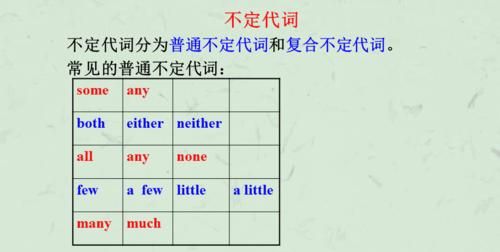
以上就是关于不定代词用法归纳总结 ,不定代词用法总结表格的全部内容,以及不定代词用法归纳总结 的相关内容,希望能够帮到您。

